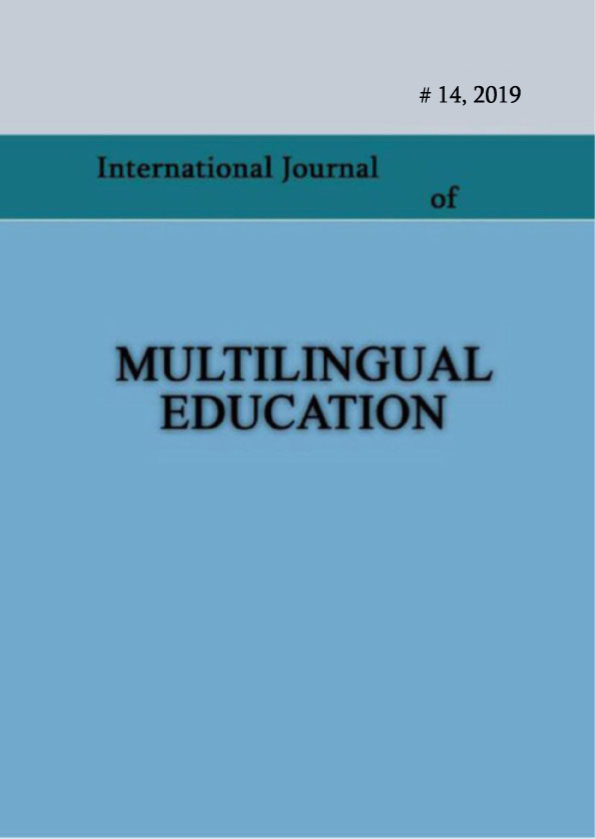The Discussion on the Status of the Russian Language in Georgian Schools
Keywords:
the Georgian Language, the Russian Language, the Imereti Press, Language Situation, SociolinguisticsAbstract
The research of the sociolinguistic picture of Imereti according to the Imereti press of the 10-20s of XX century is among the issues which have not been studied yet. After the abolition of the statehood of Georgia in 1801 the Georgian language became part of the language policy of the Russian Empire. As a result, the Russian government abolished the liturgy and the teaching process in the Georgian language, ethnic and national conflicts were provoked between the inhabitants of the territory of Georgia, etc. Pursuant to the circular issued in 1885 the Georgian language was completely removed from the syllabuses. In parallel with this anti-national policy a number of journals and newspapers were started. Covered Russia's assimilative linguistic or ethnic policy and contributed to national mobilization. It will be the first sociolinguistic analysis of the periodical publications in two directions: a. The issue of the distribution and knowledge of the Georgian language in the region (including the issue of gender). b. The problem of functioning of the Georgian language in the education (secular and theological) system.
References
Avrorin, B. (1975). Problems of functional side language (to question the subject sociolinguistics. Leningrad.
Berlitz, M. (1921). Method for Teaching Modern Languages, Berlin, Siegfried Gronbach. Chachanidze, I. (2005). The Problem of Language Situation in the 20th Century Sociolinguistics. The dissertation of a PhD of Philological Science, Georgian Academy of Sciences, Arnold Chikobava Institute of Linguistics, Tbilisi.
Ferguson, Ch. (1966). National sociolinguistic profile formulas. In W. Bright (ed.), Sociolinguistics. Procceedings of the UCLA Sociolinguistics Conference, 1964. The Hague: Mouton, 309-324.
Ferguson, Ch. (1962). The language factor in national development. In F. Rice (ed.), Study of the Role of Second Languages in Asia, Africa, and Latin America. Washington: Center for Applied Linguistics, 8-14.
Ferguson, Ch. (1959). Diglossia. Word 15:4.
Fishman, J. (1993). The Earliest Stage of Language Planning: The ‘First Congress’ Phenomenon. Berlin-New York: Mouton de Gruyter.
Jorbenadze, B. (1997). Language and Culture. Tbilisi. Jorbenadze, B. ( 1989). Georgian Dialectology, Vol. I, Tbilisi.
Kloss, H. (1968) Notes Concerning a Language-Nation Typology. Language problems of Developing Nations. In J.Fishman, Ch..Ferguson and J. Das Gupta. New York: JohnWiley and Sons. 69-86.
Kloss, H. (1966) Types of multilingual communities: A discussion of ten variables. Sociological Inquiry. 36 (2): 135-145.
Rustow, Dankwart A. (1968) Language, Modernization, and Nationhood—an Attempt at Typology. In Language Problems of Developing Nations. Eds. By J. Fishman, Ch. Ferguson and J. Das Gupta. New York: John Wiley and Sons, 87-106.
Shanidze, A. (1953). Basics of the Grammar of the Georgian Language. Vol. I, Tbilisi. Stewart, W. (1968). A sociolinguistic typology for describing national multilingualism. In J. Fishman (ed.), Readings in the Sociology of Language. The Hague: Mouton, 531-545.
Stewart, W. (1962). An outline of linguistic typology for describing multilingualism. In F. Rice (ed.) Study of the Role of Second Languages in Asia, Africa, and Latin America..Washington: Center for Applied Linguistics, 15-25.
Tabidze, M. (1999). Fundamentals of Language Policy, Directions and Results. In: New Paradigms, #3. Tbilisi, 31.
Tavzishvili, G. (1948). History of Public Education and Pedagogical Thinking in Georgia. Tbilisi.
Published
How to Cite
Issue
Section
License
Copyright (c) 2019 Irine Chachanidze, Nato Tsuleiskiri, Tamar Guchua

This work is licensed under a Creative Commons Attribution-NonCommercial 4.0 International License.
Copyright (c) - Authors who publish with this journal agree to the following terms: Authors retain copyright and grant the journal the right of first publication with the work simultaneously licensed under a Creative Commons Attribution-Noncommercial 4.0 International License, which allows others to share the work with an acknowledgement of the work's authorship and initial publication in this journal. Authors are permitted and encouraged to post their work online (e.g., in institutional repositories or on their personal website) prior to and during the submission process, as it can lead to productive exchanges, as well as earlier and greater citation of published work (see The Effect of Open Access). Authors may enter into separate, additional contractual arrangements for the non-exclusive distribution of the journal's published version of the work (e.g., post it to a repository or publish it in a book), with an acknowledgement of its initial publication in this journal.

